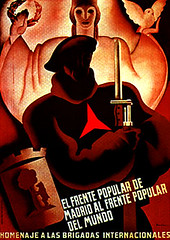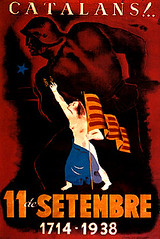Internets
I picked up a pencil and held it over a sheet of white paper, but my feelings stood in the way of my words. Well, I would wait, day and night, until I knew what to say. Humbly now, with no vaulting dream of achieving a vast unity, I wanted to try to build a bridge of words between me and that world outside, that world which was so distant and elusive it seemed unreal.
I would hurl words into this darkness and wait for an echo, and if an echo sounded, no matter how faintly, I would send other words to tell, to march, to fight, to create a sense of the hunger for life that gnaws in us all, to keep alive in our hearts a sense of the inexpressibly human.
-- Richard Wright, American Hunger


1 Comments:
"September 11 has been so co-opted, particularly by people who wanted to lead us into war. And that has become a big part of the subject matter of the strips.
As pages, they were ephemeral. They were made for newspapers and magazines that were willing to have me, mostly in my own coalition of the willing, as I’ve described it. And they weren’t really designed to be a book.
The idea of making a book implies for me a notion of posterity. At this point, yes it’s true, most books have the shelf life of yogurt, but built into the notion of a book is something that has its own small monumental qualities. To find a book out of these fragments meant making something of these strips that actually had a reason to exist together. What I was able to find was a kind of art object appropriate to the occasion: a book that looked like a tower that was both incredibly fragile and was able to get scuffed but also has that monumental quality, and a book that had a thematic discourse.
For me, it was, what’s the nature of ephemera? Here’s the best I can boil it down to: When the monumental-like two 110-story towers that were meant to last as long as the Pyramids-becomes ephemeral, the ephemeral, one’s daily life, the passing moment, takes on a more monumental quality."
Art Spiegelman
from an interview in The Progressive Jan 2005
Post a Comment
<< Home